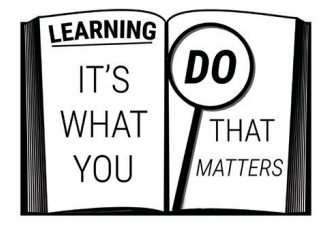By: Cristina Kerluke, Learning Commons Academic Support Program Specialist
This week’s article is adapted from our Paying Attention web page.
The very first step to learning is paying attention. Whether in the classroom, reading a textbook, listening to an online lecture, or practicing a skill for work, dedicating complete attention is absolutely critical. All of these activities entail learning. Remember: “paying” is an action. You are essentially giving your thoughts, energy, and time to what is happening in the moment. Think about when a friend, family member, or co-worker asks, “Are you paying attention to me?” Attention means focusing on what is being stated, discussed, or shown, using the senses to literally bring information into the brain. Below are strategies for increasing your awareness about attention, and your ability to pay better attention to help your brain do what it is designed to do: learn!
Be Present
As a busy college student, there are many challenges to paying full attention. To “be fully present” means to physically be where the attention needs to happen (such as the classroom), along with being mentally “there.”
- Eliminate distractions. Some of this can be accomplished by managing your learning environment. This includes removing cues associated with other activities, keeping your phone off and out of sight, and sitting close to the front when in the classroom.
- Do a “brain dump” to get any distracting ideas out of your head. For example, you may be thinking about an errand you have to run or a conversation you need to have with someone. A brain dump is transferring the ideas in your head to another medium, such as a piece of paper or your computer. Part of the brain dump can be to assign a time in the week to deal with those tasks, which frees up the brain’s need to hold onto it out of fear of forgetting.
- Practice “single-tasking.” Whether having a conversation, listening to a class lecture, or watching a movie, our brain is taking in information. If this is paired with taking out your cell phone to play a game, text, or browse social media, the brain’s attention is split between more than one set of stimuli. The brain does not have the ability to multitask, and the more often you do this, the more you are forcing the brain to pay less attention to any one thing. The result can be actually decreasing the brain’s ability to concentrate (pay full attention) and contemplate (think deeply about one thing). By single-tasking, you are building more efficient brain chemistry, priming the brain to get the most out of every learning situation.
- Don’t overschedule. Yes, you are likely balancing your academics, work, relationships, and many other things. Overscheduling is not just saying “yes” to too many time commitments. Overscheduling also can include scheduling activities back-to-back, without any transition time in between. This can create stress (a BIG obstacle to being present), but also create “attention residue.” For example, if you leave work to go to class, and when you arrive in class, you are still thinking about work, that’s attention residue! Leaving some time, even brief amounts, to think about, resolve, or document those issues before going into learning mode can be a way to prevent this. A brain dump can also help alleviate the attention residue before moving on to your next learning task.
Engage with the Material
One of the best ways to keep your attention is to be an active learner. Many students were never taught how to be active in a learning situation. This leads to students believing the way to learn is to passively listen, or to just write down what is being said word for word. Here are three ways to be active in the moment, and to avoid the boredom response:
- Take notes actively. There are many ways to take effective notes, and all of them involve connecting concepts while documenting new information. This is different than writing down everything on the board, or every word said in the class. Taking notes actively is a purposeful effort, which not only takes more attention, but also leads to deeper learning.
- Read actively. Students often say that reading a college-level textbook or article is a challenge, which makes it hard to pay attention. Reading actively involves writing down cues and keywords, checking for understanding as you go along, and summarizing in your own words.
- Question actively. Asking questions out loud or even in your own head is one of the best ways to keep your attention level high. In the classroom, take the opportunity to ask your professor for clarification. During class, ask how the concepts or information being shared connect to what you already know or understand. While reading, ask yourself “why” and “how” questions, along with connecting the reading to what you either already know or are trying to learn.
We encourage you to explore which attention channeling strategies would best support your academic efforts. Visit our AGILE website at usm.maine.edu for our deeper dive on attention, including strategies on “How to Train Your Brain, Build Motivation, and Honor Your Attention Span.”

